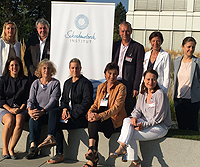In dialogue
Interesting discussions with scientists and practitioners from various disciplines.
 The Erasmus+ partners in dialogue
The Erasmus+ partners in dialogue
European research project: HS Tutorials – Practical modules for promoting writing skills in schools
Together with five project partners from Germany, Austria and Italy, the Schreibmotorik Institut is conducting a European research project within the framework of ERASMUS+. Here, the project partners outline existing difficulties in writing that occur in their particular region, reasons for their participation and what they hope to achieve.
 Dr. Simone C. Ehmig in dialouge with the Schreibmotorik Institut July 2018
Dr. Simone C. Ehmig in dialouge with the Schreibmotorik Institut July 2018
Promoting reading and writing: pursuing unusual paths to stimulate motivation and joy
Reading and writing skills are basic prerequisites for success at school. Fun is the most important motivator in this regard. Stiftung Lesen [the German Reading Foundation] reaches a large number of children, young people and their families with its offers via its network. To what extent can the promotion of reading and writing benefit from one another? Interview with Dr. Simone C. Ehmig, Director of the Institute for Research on Reading and Media at Stiftung Lesen.
 Dr. Johanna Barbara Sattler in dialouge with the Schreibmotorik Institut November 2017
Dr. Johanna Barbara Sattler in dialouge with the Schreibmotorik Institut November 2017
Left-handed children: “clarification, information and keeping calm”
Compared to before, there are hardly any conscious attempts to convert left-handers. Left-handedness has become normalised. But does that also mean people are dealing with it correctly? And how can the problems left-handers are confronted with be prevented? An interview with Dr. Johanna Barbara Sattler, a psychologist, psychotherapist and director of the first German advice centre for left-handers and converted left-handers.
 Waltraud Fürholzer in dialogue with the Schreibmotorik Institut February 2017
Waltraud Fürholzer in dialogue with the Schreibmotorik Institut February 2017
“The fingers must be able to move freely” – learning how to hold a pen properly
Children often start primary school with very different ways of holding a pen. At this stage it is already almost too late to ensure that they hold a pen properly. Alongside other factors, it forms the basis for good writing motor skills, as writing involves coordination of the fingers, wrist and arm. For example, too strong a grip can have an effect on all other movements. What’s more, bad habits are difficult to break. An interview with occupational and handwriting therapist Waltraud Fürholzer about how to hold a pen properly, finger mobility and the joy of experimenting.
 Dr. Angela Webb in dialogue with the Schreibmotorik Institut February 2017
Dr. Angela Webb in dialogue with the Schreibmotorik Institut February 2017
“Handwriting is a skill that must be taught properly” – Reforms of curricula consider writing motor skills
Since 2014 both, the curriculum in Bavaria, Germany (LehrplanPLUS) and the national curriculum in the United Kingdom, emphasize the importance of good handwriting lessons in order to develop legible and efficient handwriting. Dr. Angela Webb, Chairman of the National Handwriting Association reports on key issues and experiences in the UK. The Situation in the UK is rather different than Germany. So far writing lessons have been taking place first and foremost in preschool with the children beeing only 4 years old. After teaching the alphabet, there were no more proper handwriting lessons.
 Henk Schweitzer in dialogue with the Schreibmotorik Institut February 2017
Henk Schweitzer in dialogue with the Schreibmotorik Institut February 2017
Writing lessons: Finding the right balance between handwriting and the digital world
In the Netherlands digitisation in schools is relatively far advanced. Most schools have introduced tablets as a supplement to existing written class work. The progressive use of computers for reading and writing in everyday life, even by children, has certainly called into doubt the relevance of handwriting. A series of studies, however, have confirmed the advantages of handwriting in literacy acquisition when compared with typing. Henk Schweitzer, principal at a school with 200 pupils in the Netherlands and well experienced in childmotor development and handwriting skills depicts his experience with tablets in class.
Prof. Julia Knopf in dialogue with the Schreibmotorik Institut February 2017
“Enjoying writing” – didactic approaches for learning to write in teacher training
One of the main tasks of teachers in German primary schools is teaching children to read and write. According to current primary-level educational standards from the Conference of the Ministers of Education and Cultural Affairs, children should learn to write legibly and fluently by the end of their fourth year at school. However, teacher surveys clearly show that many teachers would like more basic didactic knowledge and practical preparation, in particular when it comes to problems with learning to write or difficulties in further developing handwriting. An interview with Prof. Julia Knopf, Head of the Chair of Teaching Methodology (German) at the Saarland University, about the aims of handwriting lessons and preparing students for classroom practice.

